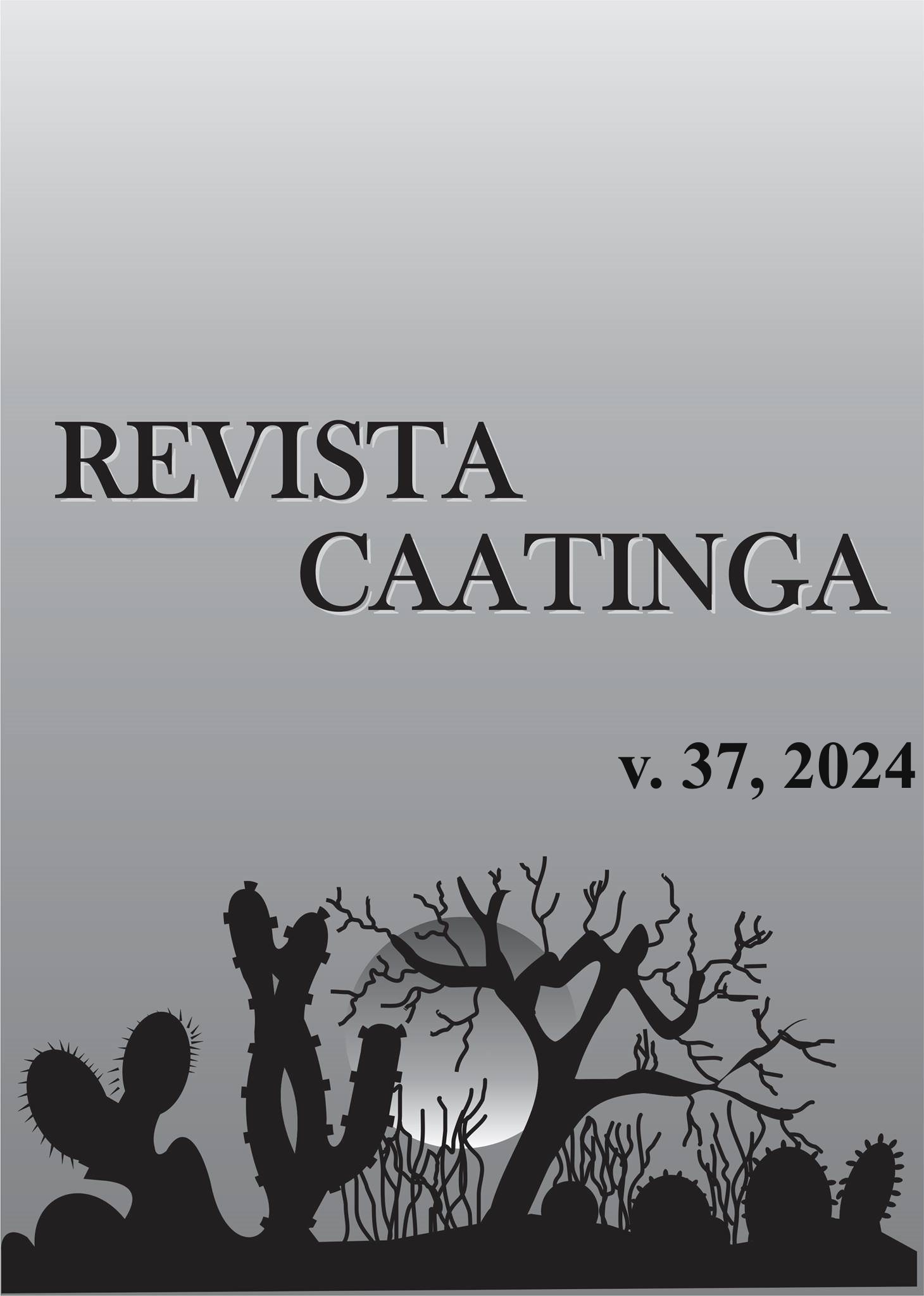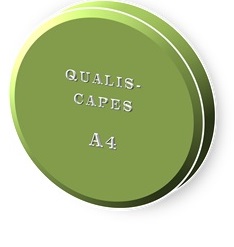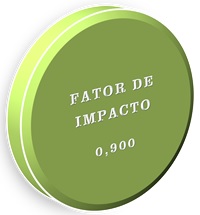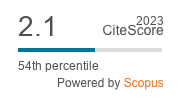Quality of yellow passion fruit seedlings under saline water irrigation and salicylic acid concentrations
DOI:
https://doi.org/10.1590/1983-21252024v3711879rcKeywords:
Passifloraceae. Salt stress. Phytohormone.Abstract
The objective of this study was to evaluate the quality of ‘BRS Gigante Amarelo’ passion fruit seedlings irrigated with brackish waters under salicylic acid application. The experiment was conducted under conditions of protected environment (screened) in the experimental area of the Federal Rural University of the Semi-arid Region (UFERSA), Multidisciplinary Campus of Caraúbas, RN, Brazil, in the period from August to November 2022, in a randomized block experimental design and analyzed in a 4 x 4 factorial scheme, with four replicates and one plant per plot, with treatments consisting of electrical conductivity of irrigation water - ECw (0.5, 1.4, 2.3 and 3.2 dS m-1) and concentrations of salicylic acid - SA (0.0, 1.5, 3.0, and 4.5 mM L-1). Electrical conductivity of irrigation water up to 3.2 dS m-1 does not affect the absolute growth, photosynthetic rate and quality of ‘BRS Gigante Amarelo’ passion fruit seedlings; ECw from the average value of 1.3 dS m-1 affects stomatal conductance, transpiration, internal CO2 concentration and root fresh and dry mass production. Foliar application of salicylic acid does not mitigate the effect of salt stress from irrigation water on the production of yellow passion fruit seedlings; however, the average concentration of 3.15 mM L-1 promotes greater absolute and relative growth, shoot fresh and dry mass and quality of seedlings. SA concentration of 1.5 mM L-1, associated with ECw of 1.0 dS m-1, is recommended for the production of “BRS Gigante Amarelo” passion fruit seedlings.
Downloads
References
ABBASZADEH, B. et al. Improving water use efficiency through drought stress and using salicylic acid for proper production of Rosmarinus officinalis L. Industrial Crops and Products, 144: e111893, 2020.
AHMED, Z. F. R. et al. Melhorando a qualidade da fruta, os compostos bioativos e a vida útil da tamareira (Phoenix dactylifera L., cv. Barhi) usando elicitores naturais. Horticulturae, 7: 293, 2021.
ALVARES, C. A. et al. Koppen’sclimate classification map for Brazil. Meteorologische Zeitschrift, 22: 711-728, 2013.
AMANY, M. S.; IBRAHIM, H. I. M. Effect of Grain Priming with Salicylic Acid on Germination Speed, Seedling Characters, Anti-Oxidant Enzyme Activity and Forage Yield of Teosinte. Journal Agricultural Environmental Science, 15: 744-753, 2015.
ANDRADE, E. M. G. et al. "Peróxido de hidrogênio como atenuador do estresse salino na fisiologia e biomassa de maracujazeiro amarelo. Revista Brasileira de Engenharia Agrícola e Ambiental, 26: 571-578, 2022.
AYERS, R. S.; WESTCOT, D. W. A qualidade da água na agricultura. Campina Grande, PB: Universidade Federal da Paraíba, 1999. 153 p.
BENINCASA, M. M. P. Análise de crescimento de plantas: noções básicas. Jaboticabal, SP: FUNEP, 2003. 42 p.
BONACINA, C. et al. A salinidade modula o crescimento, o metabolismo oxidativo e o perfil do óleo essencial em rizomas de Curcuma lona L. (Zingiberaceae), South African Journal of Botany, 146: 1-11, 2022.
DICKSON, A., LEAF, A. L.; HOSNER, J. F. Quality appraisal of white spruce and white pine seedling stock in nurseries. The Forest Chronicle, 36: 10-13, 1960.
FARHANGI-ABRIZ, S.; GHASSEMI-GOLEZANI, K. How can salicylic acid and jasmonic acid mitigate salt toxicity in soybean plants. Ecotoxicology and Environmental Safety, 147: 1010-1016, 2018.
FALEIRO, F. G.; JUNQUEIRA, N. T. V.; COSTA, A. M. Importância socioeconômica e cultural do maracujá. In: FALEIRO, F. G.; JUNQUEIRA, N. T. V. (Eds.). Maracujá: o produtor pergunta, a Embrapa responde. (Coleção 500 perguntas, 500 respostas). Brasília, DF: Embrapa. 2016. v. 1, p. 15-21.
FERREIRA, D. F. SISVAR: A computer analysis system to fixed split plot type designs. Brazilian Journal of Biometrics, 37: 529-535, 2019.
IBGE - Instituto Brasileiro de Geografia e Estatística – IBGE. Produção Agrícola Municipal. 2021. Disponível em: <https://sidra.ibge.gov.br/tabela/5457#resultado%>. Acesso em: 22 dez. 2022.
JALES FILHO, R. C. et al. Ácido salicílico e prolina modulam tolerância ao estresse hídrico em variedade tradicional de feijão-caupi. Revista Brasileira de Engenharia Agrícola e Ambiental, 27: 18-25, 2022.
LARCHER, W. Ecofisiologia vegetal. 1. ed. São Carlos, SP: RIMA, 2004. 531p.
LIMA, G. S. et al. Potassium and irrigation water salinity on the formation of sour passion fruit seedlings. Revista Brasileira de Engenharia Agrícola e Ambiental, 25: 393-401, 2021.
MEDEIROS, J. F. et al. Caracterização das águas subterrâneas utilizadas para irrigação na área produtora de melão da Chapada do Apodi. Revista Brasileira de Engenharia Agrícola e Ambiental, 7: 469-472, 2003.
MOURA, R. S. et al. Tolerância de espécies de maracujá ao estresse de sal. International Journal of Current Research, 8: 37689-37695, 2016.
NAPOLEÃO, T. A. et al. Methyl jasmonate and salicylic acid are able to modify cell wall but only salicylic acid alters biomass digestibility in the model grass Brachypodium distachyon. Plant Science, 263:46-54, 2017.
OLIVEIRA, F. T. et al. Fontes orgânicas e volume de recipiente no crescimento inicial de porta-enxertos de goiabeira. Revista Verde de Agroecologia e Desenvolvimento Sustentável, 8: 103, 2013.
RICHARDS, L. A. Diagnosis and improvement of saline and alkali soils. Washington: USDA. 1954. 160 p. (Agriculture Handbook, 60)
SILVA, A. A. R. et al. Ácido salicílico alivia o efeito do estresse salino na morfofisiologia da gravioleira. Ciência e Agrotecnologia, 45: e007021, 2021.
SILVA, A. A. R. et al. O ácido salicílico melhora os indicadores fisiológicos de gravioleira irrigada com águas salinas. Revista Brasileira de Engenharia Agrícola e Ambiental, 26: 412-419, 2022.
SILVA, E. M. et al. Growth and gas exchanges in soursop under irrigation with saline water and nitrogen sources. Revista Brasileira de Engenharia Agrícola e Ambiental, 22: 776-781, 2018.
SILVA NETA, A. M. S. et al. Morphophysiology of the passion fruit ‘BRS Rubi do Cerrado’ irrigated with saline waters and nitrogen fertilization. Comunicata Scientiae, 11: 1-9, 2021.
SUN, Y. L. et al. Moderate soil salinity alleviates the impacts of drought on growth and water status of plants. Russian Journal of Plant Physiology, 67:153-161, 2020.
TAIZ, L. et al. Fisiologia e desenvolvimento vegetal. 6. ed. Porto Alegre, RS: Artmed, 2017.888 p.
TEIXEIRA, P. C. et al. Manual de métodos de análise de solo. 3.ed. Brasília, DF: Embrapa Solos, 2017. 574 p.
ZRIG, A. et al. Potassium and calcium improve salt tolerance of Thymus vulgaris by activating the antioxidant systems. Scientia Horticulturae, 277: e109812, 2021.
Downloads
Published
Issue
Section
License
Os Autores que publicam na Revista Caatinga concordam com os seguintes termos:
a) Os Autores mantêm os direitos autorais e concedem à revista o direito de primeira publicação, com o trabalho simultaneamente licenciado sob a Licença Creative Commons do tipo atribuição CC-BY, para todo o conteúdo do periódico, exceto onde estiver identificado, que permite o compartilhamento do trabalho com reconhecimento da autoria e publicação inicial nesta revista, sem fins comerciais.
b) Os Autores têm autorização para distribuição não-exclusiva da versão do trabalho publicada nesta revista (ex.: publicar em repositório institucional ou como capítulo de livro), com reconhecimento de autoria e publicação inicial nesta revista.
c) Os Autores têm permissão e são estimulados a publicar e distribuir seu trabalho online (ex.: em repositórios institucionais ou na sua página pessoal) a qualquer ponto antes ou durante o processo editorial, já que isso pode gerar alterações produtivas, bem como aumentar o impacto e a citação do trabalho publicado (Veja O Efeito do Acesso Livre).







